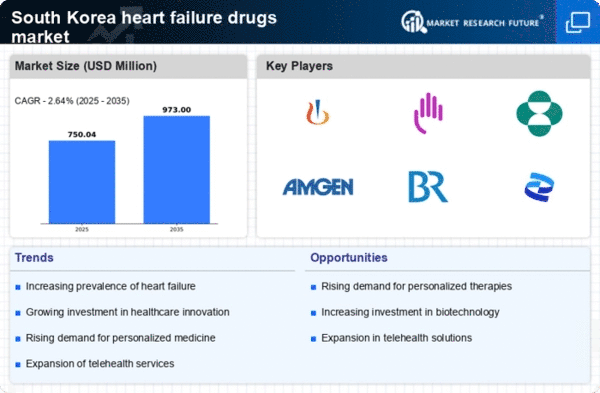Rising Awareness and Education
The growing awareness of heart failure among healthcare professionals and the general public is a significant driver for the heart failure-drugs market. Educational campaigns and training programs have been established to inform both patients and providers about the symptoms, risks, and treatment options available. This increased awareness is likely to lead to earlier diagnosis and treatment, which is essential for improving patient outcomes. In South Korea, initiatives by organizations such as the Korean Heart Association have contributed to a more informed population, potentially increasing the demand for heart failure medications. The heart failure drugs market may experience a surge as patients seek effective therapies upon recognizing the importance of managing their condition. Furthermore, as healthcare providers become more knowledgeable about the latest treatment options, they are more likely to prescribe innovative drugs, thereby driving market growth.
Advancements in Drug Development
Technological innovations in drug development are significantly influencing the heart failure-drugs market. The emergence of novel therapeutic agents, including SGLT2 inhibitors and ARNIs, has transformed treatment paradigms, offering new hope for patients. Clinical trials in South Korea have demonstrated that these advanced therapies can reduce hospitalizations and improve quality of life, which is crucial given the high morbidity associated with heart failure. The heart failure drugs market is expected to benefit from ongoing research and development efforts, with investments in biotechnology and pharmaceutical sectors reaching approximately $500 million in recent years. This focus on innovation not only enhances treatment efficacy but also fosters competition among manufacturers, potentially leading to more affordable options for patients. As new drugs enter the market, they are likely to reshape treatment guidelines and improve patient outcomes.
Aging Population and Lifestyle Changes
The demographic shift towards an older population in South Korea is a crucial factor influencing the heart failure-drugs market. As life expectancy increases, the prevalence of age-related diseases, including heart failure, is expected to rise. Current projections indicate that by 2030, over 20% of the population will be aged 65 and older, creating a substantial demand for heart failure treatments. Additionally, lifestyle changes, such as increased sedentary behavior and dietary shifts, are contributing to the rising incidence of heart failure. The heart failure drugs market is likely to expand as healthcare systems adapt to these demographic trends, focusing on preventive care and effective management strategies. This shift may lead to an increase in healthcare spending on heart failure therapies, with estimates suggesting a potential market value exceeding $2 billion by 2030. Addressing these challenges will be essential for improving health outcomes in the aging population.
Increasing Prevalence of Heart Failure
The rising incidence of heart failure in South Korea is a critical driver for the heart failure-drugs market. Recent statistics indicate that approximately 1 in 5 adults over the age of 65 are diagnosed with heart failure, leading to a growing patient population requiring effective treatment options. This demographic shift, coupled with an aging population, suggests a sustained demand for heart failure therapies. The heart failure drugs market is likely to expand as healthcare providers seek to address this increasing burden on the healthcare system. Furthermore, the economic implications of managing heart failure, which can cost the healthcare system upwards of $1 billion annually, underscore the urgency for innovative drug solutions. As awareness of heart failure grows, so too does the need for effective pharmacological interventions, propelling the market forward.
Government Initiatives and Healthcare Policies
Government initiatives aimed at improving cardiovascular health are pivotal for the heart failure-drugs market. In South Korea, the Ministry of Health and Welfare has implemented various programs to enhance early diagnosis and management of heart failure. These initiatives include funding for research, public health campaigns, and subsidies for innovative therapies. Such policies are expected to increase access to heart failure medications, thereby expanding the market. The heart failure drugs market could see a growth rate of approximately 8% annually as these initiatives take effect. Additionally, the government's commitment to reducing healthcare costs through preventive measures may lead to increased investment in heart failure treatments, further stimulating market growth. This proactive approach not only addresses the immediate healthcare needs but also promotes long-term sustainability in managing heart failure.

















